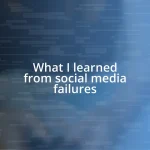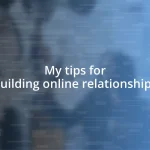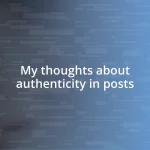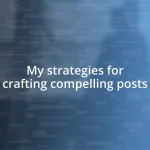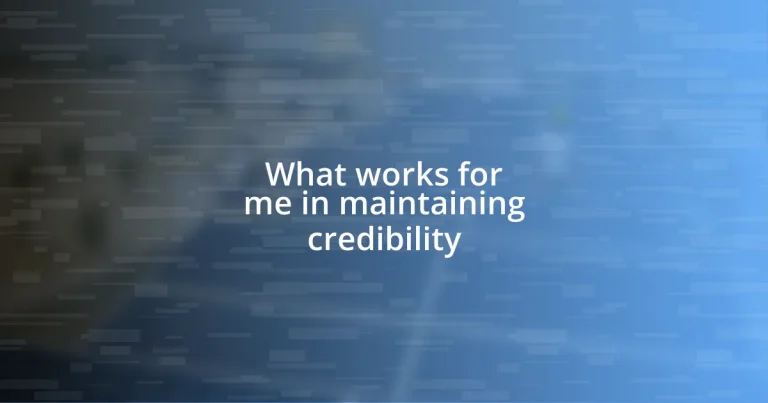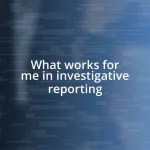Key takeaways:
- Personal credibility hinges on trustworthiness and authenticity; sharing personal stories and reflecting on feedback enhances this credibility.
- Consistency in actions builds trust, as it establishes clear expectations and strengthens relationships through reliable communication.
- Handling criticism gracefully and continuously improving skills fosters growth and enhances credibility through collaborative and open-minded interactions.
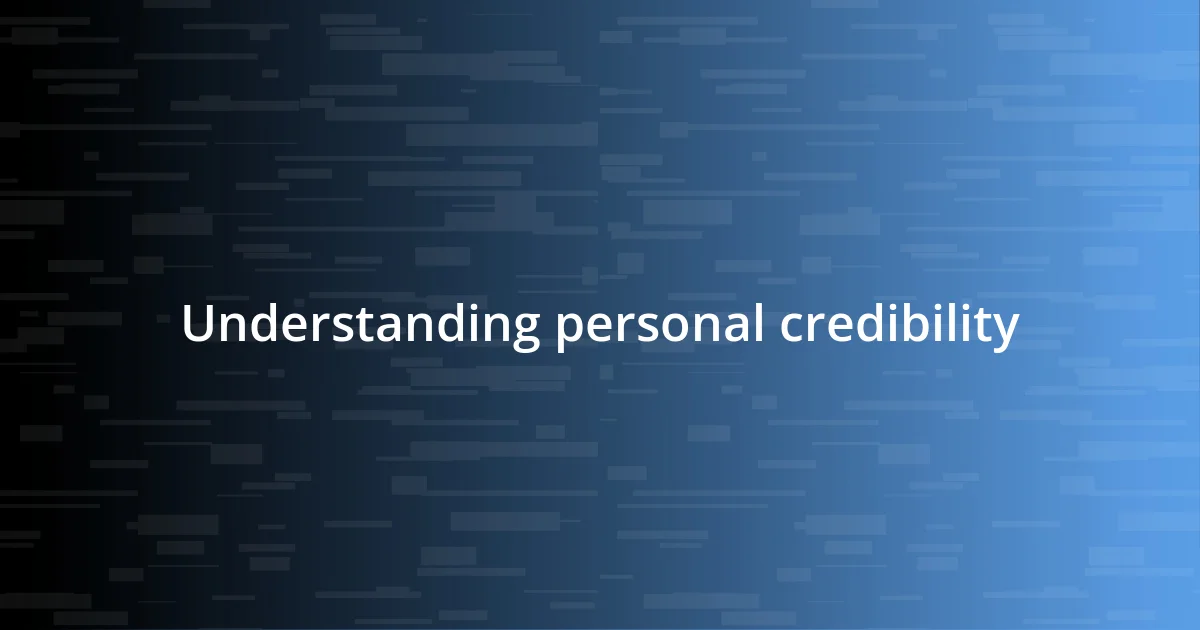
Understanding personal credibility
I find that personal credibility is built on a foundation of trustworthiness and authenticity. For me, it’s about consistently aligning my actions with my words. Think about it—if I promise to do something and then fail to follow through, how can I expect others to trust me in the future?
In my experience, sharing personal stories can really strengthen this credibility I strive for. I remember a time when I openly shared a failure with a friend, and instead of shying away, I used it as a learning moment. This vulnerability not only connected us but also reinforced my credibility—showing that I’m not afraid to admit when I’m wrong.
Sometimes I wonder, how can one truly assess their own credibility? Reflecting on feedback from peers has helped me tremendously. Each conversation I’ve had about my strengths and weaknesses has shaped my understanding of how others perceive my reliability, fueling my journey toward becoming a more credible individual.
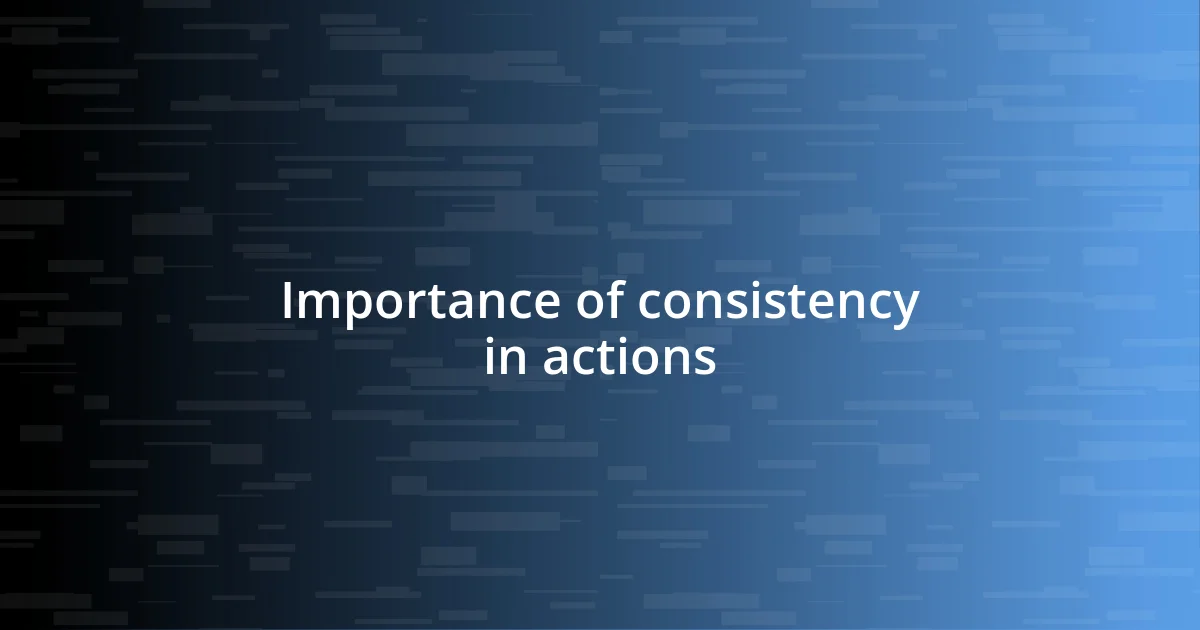
Importance of consistency in actions
Maintaining consistency in actions is like creating a rhythm in life. I remember a colleague who consistently recognized team efforts during our meetings. Over time, this practice fostered an environment of trust and respect. When he praised hard work, it reflected his genuine appreciation, making us more likely to rally behind him in future projects.
There are moments when one slip can feel monumental. I once promised a friend I would help them with a task but got sidetracked. That small inconsistency nagged at me, as it created a doubt in their mind about relying on me in the future. It was a wake-up call, highlighting how even minor lapses can have a ripple effect on how we’re perceived.
Building on that, consistency sets clear expectations. When people know I’m reliable, they feel secure relying on me. I recall a scenario where I committed to weekly check-ins with my team. This predictable pattern not only kept everyone on the same page but also allowed me to strengthen relationships. Now, my team approaches me more openly because they know I’ll be there consistently for support.
| Action | Impact |
|---|---|
| Consistent Appreciation | Builds trust and morale |
| Breaking Promises | Creates doubt and hesitation |
| Regular Check-Ins | Encourages open communication |
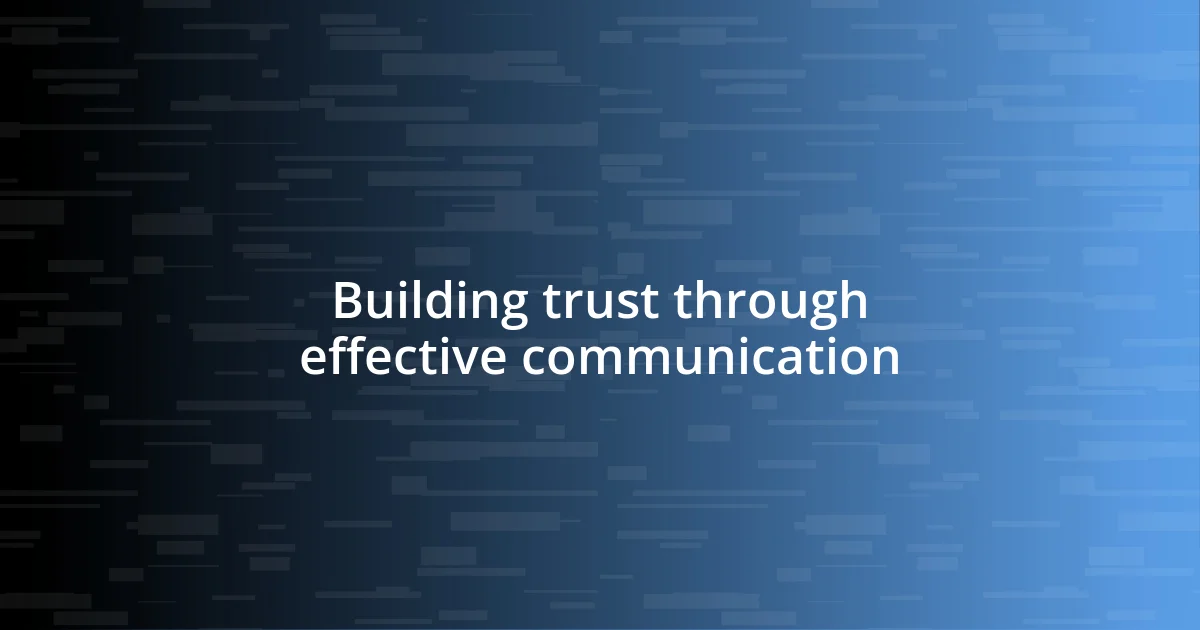
Building trust through effective communication
Effective communication is a cornerstone of building trust. I’ve experienced firsthand how taking the time to listen actively can transform a conversation. I recall a time when a team member approached me with a concern. Instead of rushing to respond, I paused and truly listened. That simple act not only made them feel valued but also strengthened our rapport, creating a more trusting relationship.
- Listening attentively fosters a sense of safety in communication.
- Clear and honest feedback helps to establish open lines of dialogue.
- Empathy in responses makes others feel understood and respected.
When I communicate openly about my intentions, it sets a clear foundation. I remember a project incident where I openly shared my thought process behind decisions, even when they weren’t popular. This transparency not only demystified my reasoning but also helped my colleagues trust my judgment. They began to feel more comfortable sharing their perspectives, which made our collaboration much more fruitful.
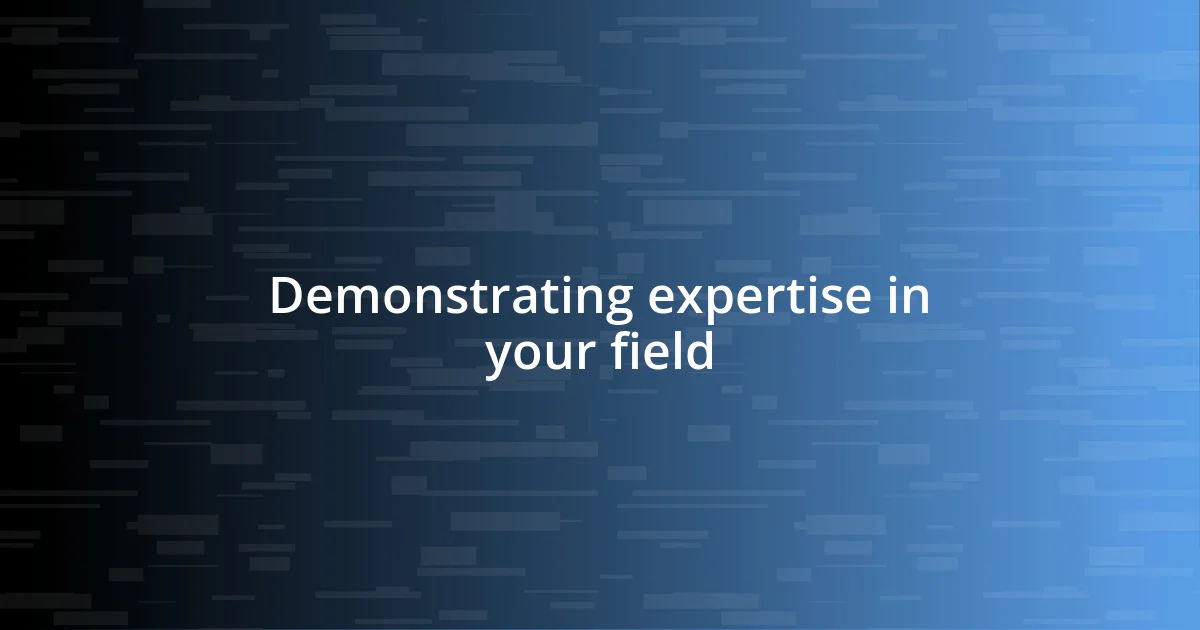
Demonstrating expertise in your field
Demonstrating expertise in your field is crucial for maintaining credibility. I’ve often found that sharing knowledge isn’t just about being right; it’s about creating a space where others can learn. I recall a workshop I led where I openly discussed not only my successes but also my failures in a project. This honesty created an environment where participants felt safe to ask questions and share their experiences. Isn’t it fascinating how vulnerability can enhance our credibility?
One way I demonstrate my expertise is by staying informed and sharing relevant updates with my colleagues. For instance, after attending a conference, I made it a point to compile key insights and present them to my team. It wasn’t just the information that mattered; it was the conversation it sparked. Everyone left that meeting feeling inspired and empowered, which highlighted the importance of being a conduit of knowledge rather than just a gatekeeper. Have you noticed how sharing insights can transform your team dynamics?
Engagement also plays a significant role in showcasing expertise. When I participate in industry forums or discussions, I aim to provide thoughtful contributions instead of just agreeing or nodding along. Recently, I contributed to an online discussion about emerging trends in our field. My perspective, grounded in personal experience and research, not only showcased my understanding but also prompted further dialogue. Isn’t it rewarding to see conversations unfold just because you dared to share your viewpoint?
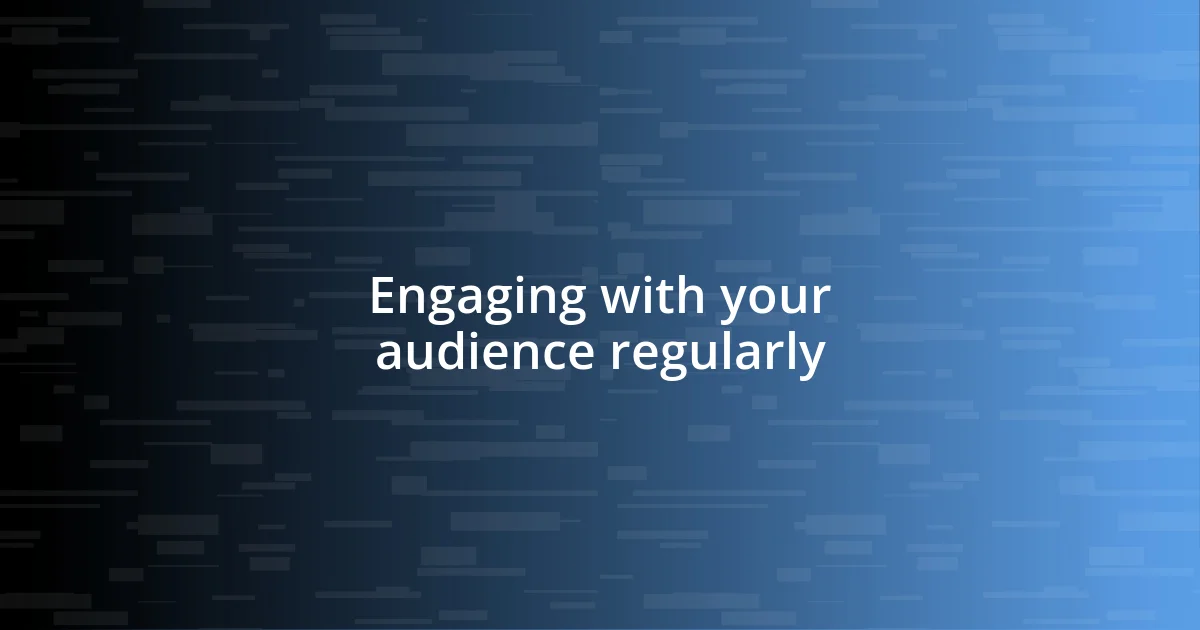
Engaging with your audience regularly
Engaging with your audience regularly is essential for maintaining credibility. I remember the thrill of hosting a monthly Q&A session where team members could ask me anything. This wasn’t just a platform for them to voice concerns; it was a moment for me to connect, share insights, and really understand their perspectives. Have you ever thought about how these interactions can bridge gaps and provide clarity?
I find that consistency is key. For example, sending out a weekly newsletter with updates, insights, or even my thoughts on industry trends has helped keep the lines of communication open. It’s amazing how something as simple as weekly check-ins can make your audience feel informed and included. Can you imagine the sense of community that builds when everyone knows they’re in the loop?
Sometimes, I take it a step further by engaging with people on social media. I recall a time when I shared a post about a challenge I faced at work, inviting my connections to share their thoughts. The response was overwhelming! Not only did I gain new insights, but I also fostered a stronger connection with my audience. Isn’t it incredible how sharing our journeys can spark authentic conversations?
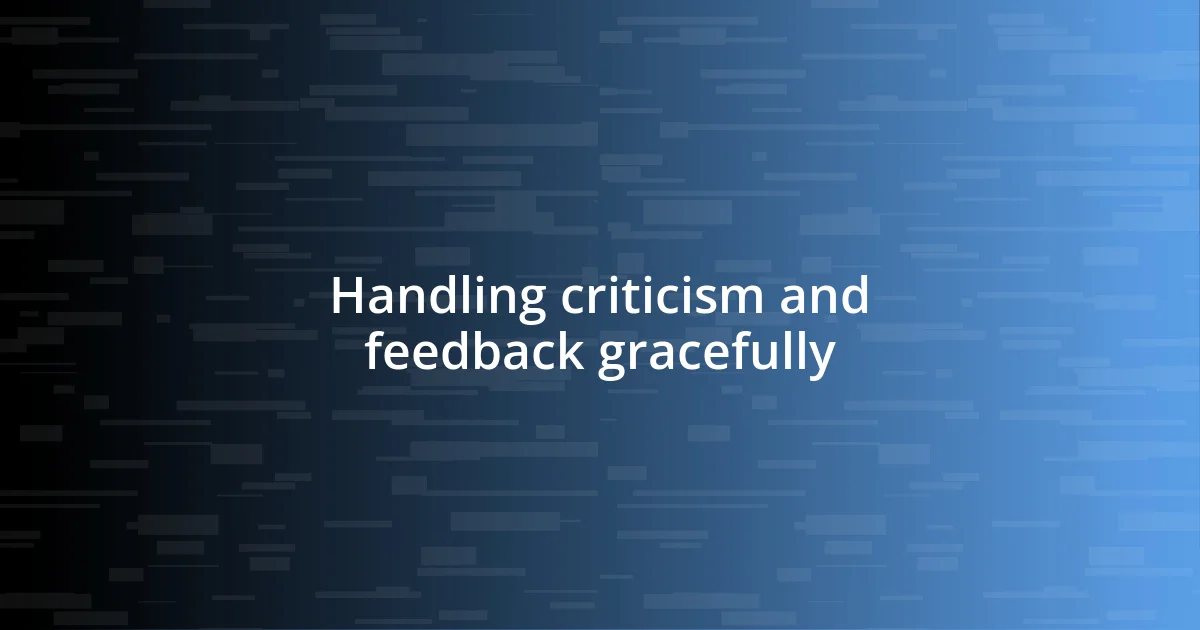
Handling criticism and feedback gracefully
Handling criticism and feedback gracefully is an art form that I’ve been honing over the years. There was a time when I received pointed feedback on a presentation I thought was solid. Instead of bristling at the comments, I took a deep breath and thanked my colleague for their insights. Looking back, I realize how that moment not only improved my future presentations but also strengthened my relationship with that colleague. Isn’t it interesting how a little humility can pave the way for growth?
Another approach I value is actively seeking out feedback, even when I’m unsure of the outcome. I remember feeling nervous before a big project launch, so I reached out to a trusted mentor for their thoughts on my plan. Their constructive criticism was uncomfortable, but I embraced it because I knew it would help me refine my strategy. That experience taught me that being open to feedback—even when it’s hard to hear—can ultimately lead to better results. Have you considered how seeking feedback can transform your work?
Moreover, I’ve learned the importance of responding to criticism with curiosity rather than defensiveness. The other day, a team member highlighted a flaw in my approach during a meeting. Instead of getting defensive, I asked them to elaborate on their perspective. This turned into a valuable discussion that not only clarified the issue but also fostered a collaborative atmosphere. It’s fascinating how approaching criticism with a mindset of curiosity can unlock new insights and build stronger team dynamics, isn’t it?
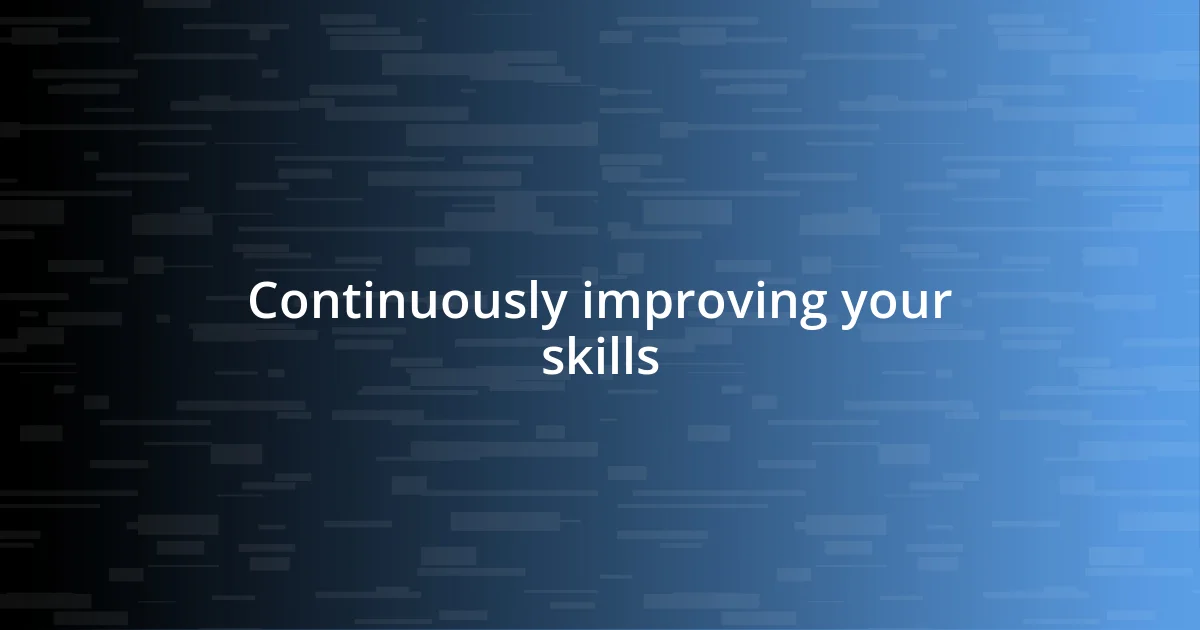
Continuously improving your skills
Continuously improving your skills isn’t just a necessity; it’s a thrill for me. I remember enrolling in a public speaking workshop not long ago. It was intimidating at first, standing in front of a group, but the rush I felt after delivering my speech was unmatched. Have you ever experienced that sense of accomplishment when you break through your comfort zone? It’s exhilarating!
There’s something rewarding about setting small, achievable goals related to skill enhancement. I often dedicate an hour each week to learn a new software tool relevant to my work. Just the other day, I delved into a project management app that’s now my go-to for enhancing team collaboration. It’s amazing how a little time investment can lead to significant improvements. Have you thought about how small changes can lead to greater productivity?
Moreover, I’ve found mentoring others to be one of the best ways to refine my own skills. By guiding a junior colleague through a challenging project recently, I was forced to articulate my thought process clearly. It was enlightening to see how my insights impacted their approach. Isn’t it fascinating how teaching can deepen your understanding and spark new ideas? Each interaction reminds me that growth is a shared journey.




